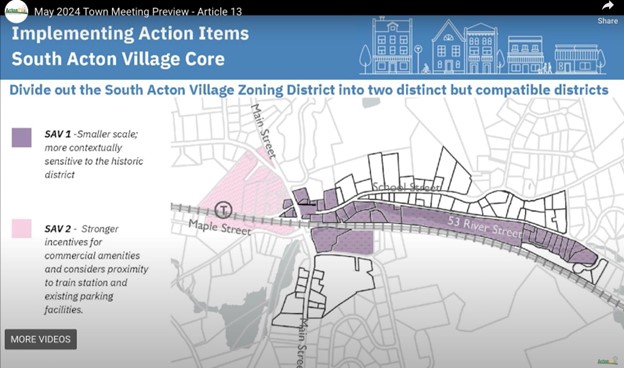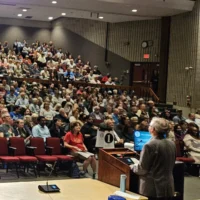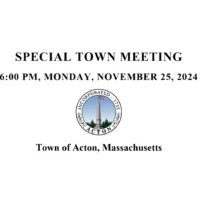The Acton Exchange covers three of the four Town Meeting zoning articles this week.
The Planning Division’s presentation of the zoning articles to the Planning Board on March 19 as well as an open house on the Powder Mill Corridor project (related to Article 11) were previously reported on in the Acton Exchange.
Article 11 Amend Zoning Overlay along the Assabet River
Town Meeting Article 11 asked the Town to amend the Zoning Bylaw and associated Zoning Map to include a new overlay district in the southeasternmost corner of Acton, where Acton abuts Maynard, Concord and Sudbury. As a zoning bylaw change, the motion required a 2/3 vote to pass. With 78% in favor, as determined by clicker count, the motion clearly passed.
An optional zoning overlay district defines a section of a town within which there are incentives for landowners and developers, to encourage certain types of development. John Cappetta, Chair of the Planning Board, presented the Article, with support from other Planning Board Members and Acton Town Planning Director Kristen Guichard. The presenters emphasized that the article before Town Meeting was the outcome of years of planning, study and community input, involving staff and stakeholders from both Acton and Maynard, as documented in the Connect Powder Mill Road report. Maynard voters will be considering a similar zoning bylaw amendment at their Town Meeting on May 20, 2024.
The catchline for Cappetta’s presentation, both at Town Meeting and in the preview video, was “to make the Powder Mill River Corridor a place that people will want to visit, not just drive through.” Referring to the Assabet River as an “underutilized resource” in Acton, the presenters described two subdistricts, shown in the map below. In subdistrict A, closest to the Assabet River, the overlay zoning would require commercial use on the ground floor by “businesses that typically have a regular flow of people into and out of the establishment.” Subdistrict A would allow either commercial or residential uses on second and third floors. In subdistrict B, a wider range of commercial uses would be allowed by right, but no by-right residential development.
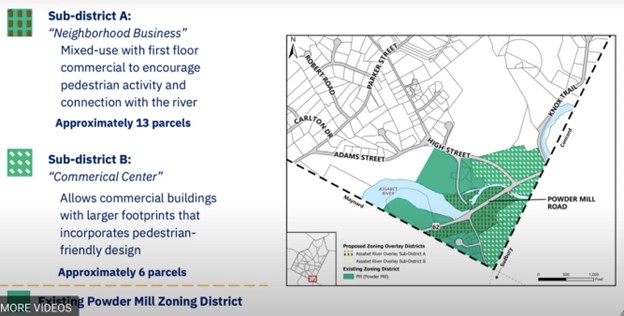
In both subdistricts, sidewalks and other pedestrian-friendly design features would be required, such as street trees and pedestrian plazas. New buildings would be required to provide access to or a view of the Assabet River, potentially “a walkway, path, viewing area, or seating area.” A developer who opts to follow the overlay zoning rules would not be subject to the minimum parking space requirements currently imposed under the base zoning for this area, and would have to install at least one electric vehicle charging station. To cut down on pollution reaching the Assabet River, building materials would have to include some materials that are certified as “low-emitting” by the LEED program, and each lot would have to include at least one “green” stormwater management feature above and beyond the requirements of Acton’s stormwater bylaw.
The Planning Board, the Select Board, and the Finance Committee all recommended the article. Catherine Usoff, Chair of the Economic Development Committee, spoke in favor of the article from the floor. “To help alleviate the residential property tax burden,” she said, “we can’t just sit and wait for businesses to come … The zoning articles move us [towards] having attractive, vibrant areas in town where people live, work, shop and dine in an environmentally sustainable way.”
Discussion by Town Meeting members was lively. Since this overlay zoning is optional, an owner or developer can follow either the overlay zoning or the base zoning. “What then,” asked a Town Meeting member, “is the incentive for a developer or owner to adopt the overlay development pattern?” The incentive is more floor area, according to the article presenters. “Are there any existing businesses that will have to be removed or changed?” No, replied the presenters. Any zoning bylaw change applies only to new development or new use; any existing business can stay, categorized as “pre-existing non-conforming.”
Several Town Meeting members commented on the environmental or sustainability elements of the plan. A commenter at the “Pro” microphone noted that we in Acton always vote yes on land conservation projects because it’s easy to see why that is good for the environment; but this is a different approach to being good for the environment, by putting things within walking distance. A speaker at the “Con” microphone preferred that we “leave the river alone. D; development doesn’t help the river; leave the river alone.” The presenters responded that “sustainability is part of the proposal,” and recounted a comment from one property owner who said that he only sees the river when he takes his garbage out back to the dumpster.
The complete discussion of this article can be viewed on ActonTV, beginning at minute 48.
Article 12 Amend Zoning Bylaw – MBTA Overlay District
Acton’s Town Meeting took a large step away from its 75-year history of single-family residential zoning and towards incentivizing multi-family residences by voting to adopt Article 12. The Article complies with the Commonwealth’s MBTA Communities Law, while implementing priorities of the South Acton Vision and Action Plan, Acton’s Climate Action Plan, and the Comprehensive Community Plan, Acton 2020. Although the MBTA Law requires only a 50% majority vote, Article 12 passed with 69% in favor to 31% opposed.
Article 12 does not require development of new multi-family housing, but allows it by right, eliminating the need for a Special Permit. Any multi-family residences developed under Article 12 will require that 10% of the units be deed restricted affordable at 80% of the Area Median Income in perpetuity.
Article 12 creates three new overlay districts – two “Overlay District 1” (residential and mixed use) and one “Overlay District 2”. Overlay Districts 1, within a half mile radius of the MBTA Train Station, will allow small-scale multi-family housing at a maximum of 10 units per acre, with the mixed-use part along Central Street also allowing for commercial uses on the first floor. Overlay District 2 allows for larger scale multi-family housing at a maximum of 25 units per acre. Site plan review and a public hearing before the Select Board is required. Overlay District 2 comprises two locations: one at the existing Dover Heights apartments and neighboring property, and one on Powder Mill Rd. The approval process will assure compliance with all applicable laws including: Acton’s Local Wetlands Bylaw, Title 5, Acton’s Board of Health regulations, Chapter X (stormwater), Acton Water District permitting, and mitigation fees.
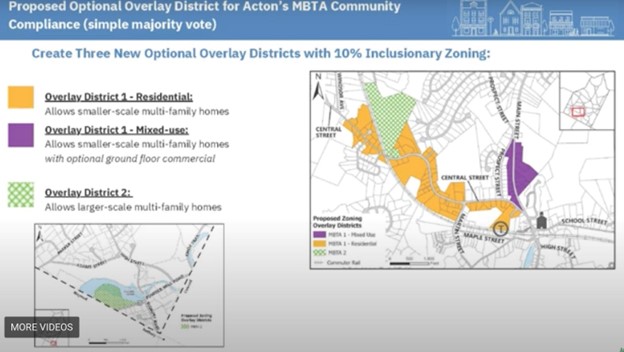
The Select Board and the Planning Board voted unanimously to recommend Article 12, while the Finance Committee voted 5 to 4 to recommend, with Members opposed concerned about future fiscal impacts on the Town.
Judy Hodge spoke on behalf of Mothers Out Front in support of Article 12, expressing that single-family zoning “. . . includes our history of white supremacy” by allowing “enormous” houses and keeping out more affordable multi-family housing, and that multi-family housing is consistent with Acton’s climate initiative. Madeline Cruz was opposed because the Article “doesn’t protect existing renters” and the low level of affordable housing required. Other opponents were concerned about overdevelopment leading to increased taxes because of higher costs for town and school services. A Motion to Defer Indefinitely failed by a vote of 33% in favor to 67% opposed.
Article 13 Amend Zoning bylaw and Zoning Map – South Acton Village Districts
After Article 12 passed, Economic Development Committee Chair and South Acton Vision Advisory Group Member Catherine Usoff presented Article 13, which, she stated, “complements Article 12 and was part of the same comprehensive planning effort.” The Article updates the 1995 South Acton Plan, which has proven ineffective in achieving the vision established through a community outreach effort.
Residents responding to a Town-wide survey desired retail shops, restaurants, and art galleries, with growth and mixed-use development concentrated in village centers. There are currently no restaurants in South Acton Village, only one retail store, very limited mixed-use, and marginal growth since 1995.
Article 13 allows village-scale commercial use and mixed use that is grounded in market realities to align the vision with zoning. The Select Board, Finance Committee and Planning Board all voted unanimously to support Article 13.
Danny Factor, a member of Housing and Climate Justice for Acton, opposed the article because of concerns about the effects on renters such as the apartments located on Railroad Street. Terra Friedrichs also opposed it, stating that Article 13 “will not – create affordable housing, shift the tax burden away from residential, preserve naturally affordable housing, help small businesses, preserve historic assets, or get us what we have in West Acton.”
Article 13, which required a 2/3 vote margin, passed by a vote of 69% in favor to 31% opposed.
Peter Berry was a Select Board member for nine years. He is presently an Acton Housing Authority Commissioner and serves on the Community Preservation Committee. Kim Kastens is a volunteer writer, editor and board member for the Acton Exchange.

